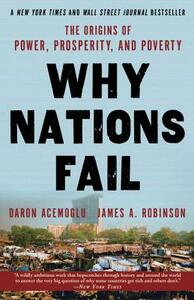You need to sign in or sign up before continuing.
Take a photo of a barcode or cover
693 reviews for:
Why Nations Fail: The Origins of Power, Prosperity, and Poverty
Daron Acemoğlu, James A. Robinson
693 reviews for:
Why Nations Fail: The Origins of Power, Prosperity, and Poverty
Daron Acemoğlu, James A. Robinson
The book can best be summarized by some excerpts from the last chapter which states:
Countries become failed states not because of their geography or their culture, but because of the legacy of extractive institutions, which concentrate power and wealth in the hands of those controlling the state, opening the way for unrest, strife, and civil war.
These theories gets divided into two segments throughout the book. One being of extractive and the other being of inclusive institutions and the book gets on to explain why these exist in the first place and their cause or events that could have led to and shaped the current society.
A good read.
Countries become failed states not because of their geography or their culture, but because of the legacy of extractive institutions, which concentrate power and wealth in the hands of those controlling the state, opening the way for unrest, strife, and civil war.
These theories gets divided into two segments throughout the book. One being of extractive and the other being of inclusive institutions and the book gets on to explain why these exist in the first place and their cause or events that could have led to and shaped the current society.
A good read.
Why Nations Fail present really good and interesting Ideas, but retold them again and again in a very boring and cumbersome ways.
It could be a very good book if it had a good editor who chop it up to one-third of its current size. Most unique ideas are presented in first two chapters after it gives useless examples in lame ways as if proving it legitimacy in court.
I really want to read it but book is like challenging me by boring me to death. I finally give up after reading 52% of it. Hope I pick up in future and complete it but not now.
All that said, It’s may be good for people specializing in such field or want to do a deep dive study, Not for general audience though (It's probably my mistake from start).
It could be a very good book if it had a good editor who chop it up to one-third of its current size. Most unique ideas are presented in first two chapters after it gives useless examples in lame ways as if proving it legitimacy in court.
I really want to read it but book is like challenging me by boring me to death. I finally give up after reading 52% of it. Hope I pick up in future and complete it but not now.
All that said, It’s may be good for people specializing in such field or want to do a deep dive study, Not for general audience though (It's probably my mistake from start).
challenging
informative
reflective
fast-paced
"Por qué fracasan los países" intenta responder porqué algunos países se desarrollan mientras que otros se mantienen en la pobreza. Desde un enfoque institucionalista sostienen que los países exitosos lo son porque tienen instituciones "inclusivas" mientras que las de los otros son "extractivas". Las instituciones inclusivas protegen los derechos de propiedad y permiten a todos los ciudadanos participar de relaciones económicas y generar ganancias. Por otro lado, las instituciones extractivas excluyen a grandes segmentos de la población de las ganancias de la economía, beneficiando a una elite.
Esta teoría es tentadora por su simplicidad pero llega al punto de pecar de simplista al dejar de lado otros factores como la geografía, la historia y la geopolítica. Los autores no se basan en estadísticas (que podrían darle más peso a sus hipótesis) sino en una selección arbitraria de casos históricos. Dejando de lado los errores fácticos que hay en varios de ellos, su teoría ni siquiera se sostiene con los casos que eligieron especialmente para ello. El caso más importante es China que florece económicamente desde hace décadas a pesar de recurrir a instituciones extractivas. Cuando un resultado es contrario a su hipótesis los autores sostienen que "eventualmente" el crecimiento se detendrá en esos países, aun cuando lleven décadas o incluso siglos funcionando así. Sin embargo en el sentido contrario apenas unos años de buenos resultados con instituciones inclusivas son suficientes para probar su punto.
Otro punto que se debe atender es que no demuestran el sentido de la causalidad. ¿Los países se desarrollan porque tienen instituciones inclusivas o el progreso económico lleva a que aparezcan estas instituciones? No es dificil pensar ejemplos en el segundo sentido.
Si bien es fácil de leer para cualquier público, el libro se vuelve un poco pesado con la reiteración de ejemplos similares. Los conceptos son pocos y poco desarrollados y se recurre constantemente los casos históricos.
Esta teoría es tentadora por su simplicidad pero llega al punto de pecar de simplista al dejar de lado otros factores como la geografía, la historia y la geopolítica. Los autores no se basan en estadísticas (que podrían darle más peso a sus hipótesis) sino en una selección arbitraria de casos históricos. Dejando de lado los errores fácticos que hay en varios de ellos, su teoría ni siquiera se sostiene con los casos que eligieron especialmente para ello. El caso más importante es China que florece económicamente desde hace décadas a pesar de recurrir a instituciones extractivas. Cuando un resultado es contrario a su hipótesis los autores sostienen que "eventualmente" el crecimiento se detendrá en esos países, aun cuando lleven décadas o incluso siglos funcionando así. Sin embargo en el sentido contrario apenas unos años de buenos resultados con instituciones inclusivas son suficientes para probar su punto.
Otro punto que se debe atender es que no demuestran el sentido de la causalidad. ¿Los países se desarrollan porque tienen instituciones inclusivas o el progreso económico lleva a que aparezcan estas instituciones? No es dificil pensar ejemplos en el segundo sentido.
Si bien es fácil de leer para cualquier público, el libro se vuelve un poco pesado con la reiteración de ejemplos similares. Los conceptos son pocos y poco desarrollados y se recurre constantemente los casos históricos.
informative
slow-paced
medium-paced
Gud buk. thanks for the tip how to destroy an country =D
buen libro para saber porque estamos como estamos, sobre todo en latinoamérica
challenging
informative
reflective
slow-paced
The book was very slow-paced and was hard to follow along at times because it didn't make sense but you have to figure it out for yourself. There were times i had to look things up, and do a little bit or research to understand what was truly going on. reading this really makes you think about how we live in such a good country because there are so many countries that struggle with freedom and habe the option to vote and go out and do things.







